#Antigone and Ismene
Explore tagged Tumblr posts
Text
I know Antigone and Electra are my babygirls. Honestly though I feel like they are not very similar to each other. Total opposites. You know who is similar to each other? Antigone and Orestes.
Both are extremely loyal to their siblings, to a fault. Orestes was always cautious of the plan to kill Clytemnestra, but he did so because his sister encouraged him. He would’ve done anything Electra told him to, because he was so loyal to her. Same with Antigone. She would do anything for her brother, no matter the cost.
They’re both so pious, too. Orestes had no idea what he was getting himself into when he came back to Mycenae, but he believed the Oracle and did was Apollo told him to. Whatever his lawful consequences were didn’t matter to him. Antigone defied the law of the land to uphold the law of the gods. It got her killed, but she didn’t care. She died with honor. They put their gods above their rulers.
Finally, they left behind their sisters. Electra and Ismene are the last man standing in their respective stories. Nothing but collateral damage. Forced to live a life without those most dear to them. Forced to navigate an unfamiliar land, a new way of life. All that’s left of their siblings is the memories they hold so dear. Nobody thinks of them until it’s too late. They are the sole heirs to a cursed throne.
#Antigone and Orestes also had Shit To Do#they didn’t have time to question anything#greek mythology#greek tragedy#classics#greek literature#tagamemnon#orestes#Electra#elektra#electra and orestes#elektra and Orestes#antigone#Antigone and Ismene#Ismene
29 notes
·
View notes
Note
I was reading Arch-Conspirator by Veronica Roth, a sci-fi retelling of Antigone. Like the myth, Antigone's sentenced to buried alive in a tomb and her sister begs to join her, except the tomb is a spaceship not expected to complete its journey, and... they do wind up leaving together. Feels super shippy. Continued next ask with a quote:
Quote; "What are the years worth," she (Ismene) said in a whisper, her eyes fixed on mine. "Let me tell you a secret, Antigone, something I have never told anyone: I am glad the same blood runs in our veins. I'm like a bird that's fallen in love with its own reflection; (snip) "If I go with you," she said, "we will have a brief adventure." And then Antigone, crying, accepts and they board a lonely spaceship to nowhere.
Sci-Fi Antigone, fascinating. Thanks for the ship rec, Anon!
#asks#anonymous#first post#r: sisters#nc#antigone#mythology#greek mythology#arch conspirator#antigone and ismene#tw: incest#commentary#noiv#nr
10 notes
·
View notes
Text

this test of the mountain
#poets on tumblr#poetry#original poem#writeblr#writers on tumblr#writing#poem#mine#poems and poetry#poetry forms#contrapuntal poem#original poetry#antigone#ismene#sophocles#tagamemnon#greek mythology#dark academia#sibling relationship#siblings#sisters#web weaving#grief#grief poetry
2K notes
·
View notes
Text
this is my EXACT niche rn
Really their problem is that Kendall and Shiv would both want to be antigone and get into conflict about who gets to do it
906 notes
·
View notes
Text
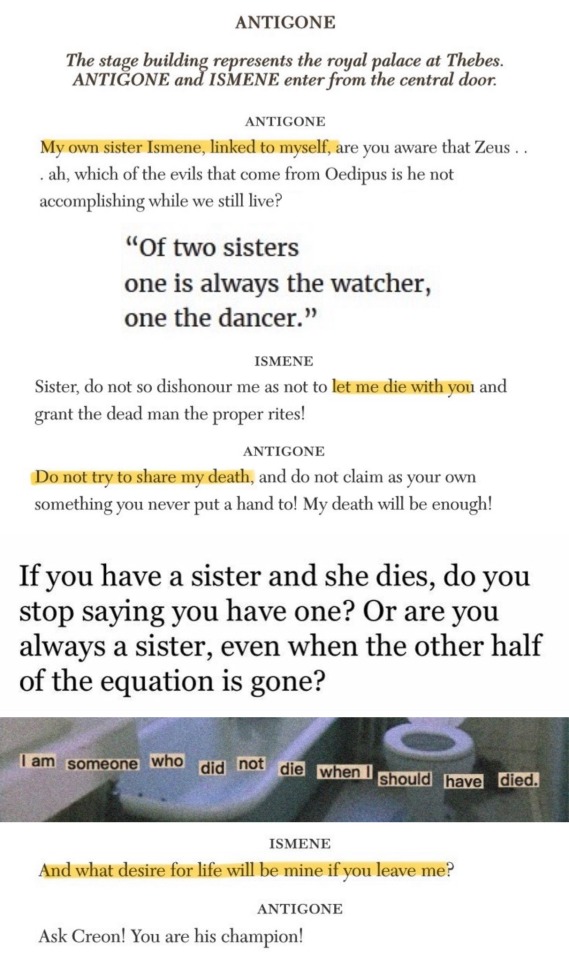
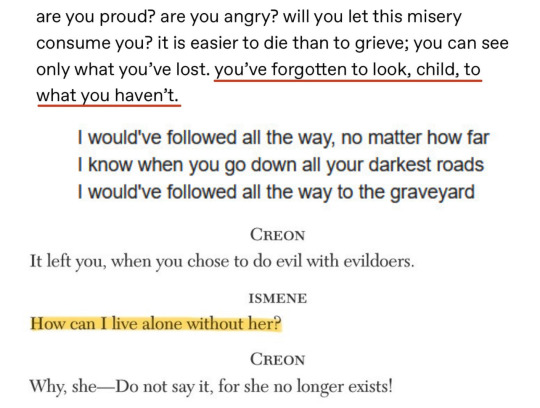

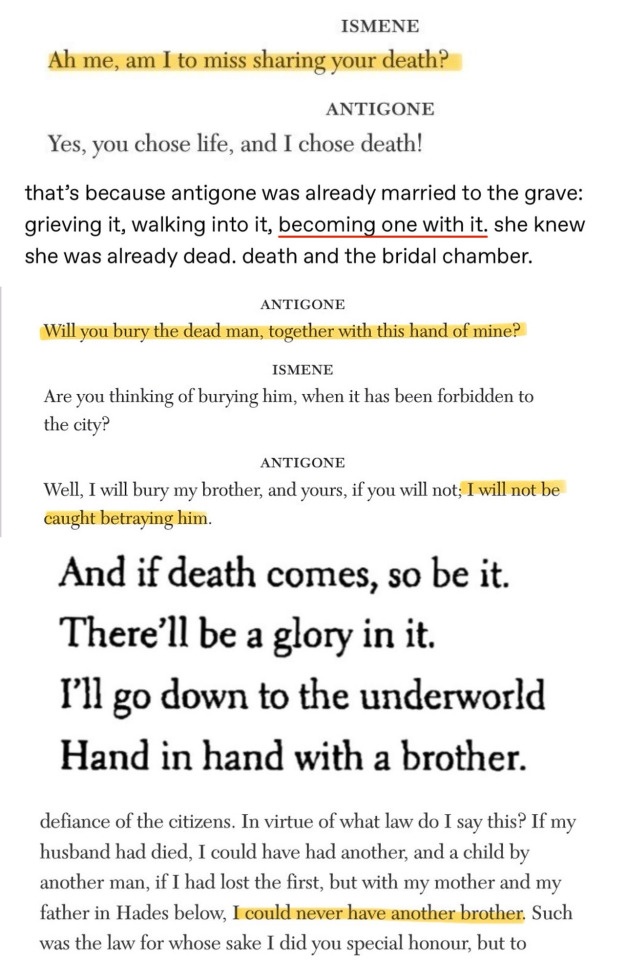
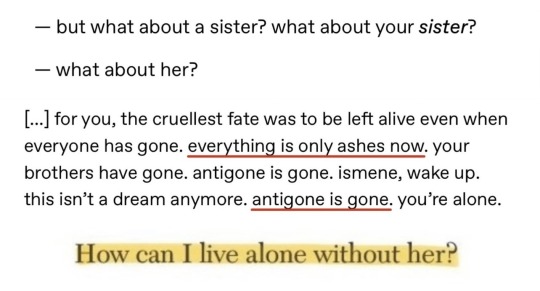
ismene/antigone; on being left behind
all highlighted excerpts from sophocles’ antigone, trans. hugh-lloyd jones // other excerpts in order: louise glück - tango / jodi picoult - my sisters keeper / unknown / mine / halsey - graveyard / unknown / mine / seamus heaney - the burial at thebes / mine
#antigone#ismene#sophocles#sophocles antigone#greek tragedy#web weaving#greek mythology#ancient greek#sisterhood#classics#<- idk how to tag this#mossy posts#🏺#anyway. this felt like blood letting. it’s barely coherent and not good but whatever i dont careeee#comprehensible to me and me only. but do you see.
104 notes
·
View notes
Note
What kind of tender words that are used between friends in greek myths? I am genuinely interested at how tender they could be that people saw it as romantical?
Hmm there is plenty since the ancient Greek writing was supposed to be emotional in the first place. I analyze some of it to my post about Achilles and Patroclus;
OK your question is very good to be reminded of of course and have them gathered around once more. So here are some examples;
Words that come from the ancient word φιλέω-ώ (filèo or filò). The verb means "to love" but the word of love here can be used in various contexts including friendly love or family love or even romantic. An example of course from the Iliad and Achilles:

But what pleasure/happiness is left of me when my beloved companion is lost?
(Translation by me)
In the passage Achilles is using the term φίλος (fìlos) which here means "beloved" or "dear" and goes along with the term that stands for "companion" (which be analyzed further down). The same word is used for any type of tender relationship (with friends family partner or even country and land). In fact the term φίλος is used for example in Aeschylus to signify the tender companionship between Orestes and Pylades which doesn't present such passionate scenes between the characters to indicate relationship also we see characters like Menelaus using it for Odysseus again without sexual or romantic implications or from Thetis to her son. But obviously in the passage of Achilles it is much more passionate. And in this context is also used to the full degree φίλτατος aka "the most beloved". Here's an example from Eurypedes's "Orestes"

This one is the most beloved (here: to me) among the mortals
(Translation by me)
Throughout the play Orestes and Pylades have an amazing bond of companionship and friendship. This is the passage of Orestes describing what Pylades is to him. Between them though there isn't the same intensity or passion that one could place between Achilles and Patroclus so the nature of their relationship seems to be what it seems: tender and close friendship. And of course partnership.
And speaking of which the second word in this passage is:
The word ἑταῖρος (etèros) which stands for "comrade" or "companion". As a word is used to all kind of contexts from a friendly relationship to partners in the army or war or in a trip. For example one of the most famous examples of someone using that word is no other than Odysseus himself to refer to his crew:
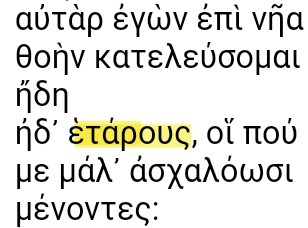
And I immediately rushed back to my swift ship where I found my comrades grieving severely
(Teanslation by me)
So the word itself is resembling in both use and meaning of the word "another" it was also often translated as "your significant other" which is why also one translates the word as "partner" on occasion and used for husband and wife but obviously that is not the way Odysseus uses it vs Achilles using it of course to the passage I initially quote.
The phrase κεχαρισμένος/η θυμῷ (keharismènos/I thymò) which means "dear to my heart". The phrase is used in various contexts that seem to be interpreted as lovers but also used between characters such as Telemachus and Nestor's son Peisistratus (who also reside to the same room and bed thus leading many interpret their relationship as romantic or of sexual nature) or even as known in the Iliad Briseis uses the same phrase to Patroclus seen from my analysis above.
The phrase though is being used in various of contexts where we hardly assume any friendship yet alone romance (see my funny post where Agamemnon uses that phrase to refer to Diomedes)
So as you see in this context reminds me of good old comedies when men were addressing each other as "hi honey!" Or "certainly, darling" in one way so it is more like a phrase to point towards companionship in that context rather than any sort of fully lovey phrase. The phrase though has been used equally by characters like Telemachus with Nestor's son Peisistratus with whom they share a room and apparently is indicated they share a bed. It is unclear if that indicates that they have some relationship apart from the natural closeness between two people of the same age. Although many readers indicate the passage where they sleep together in the same bed as sexual might as well be the same as...any sleepover young people might have. But as I mention to the example of Agamemnon, the phrase is not necessarily used in a sexual or romantic manner.
"Same as my own head/as my own life". This phrase is used for devotion and expression of outpost love aka that you love someone equally to your own life. As a phrase it was linked with various of characters with of course the most prominent one being Achilles:

The one I valued most of all of my companions, equal to my own life!
(Translation by me)
Achilles uses the phrase I highlight with word ἶσον -> equal and ἐμῇ κεφαλῇ -> my own head (aka "my own life"). The phrase is used in a different manner and a different word in the Greek tragedy "Antigone" where the heroine is opening the play with a very passionate and tender speech towards her sister:
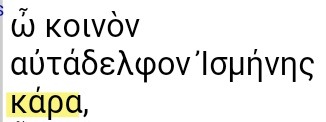
Oh my most beloved sister Ismene
(Translation by me)
Here the word κάρα which means "head" or "heart" depending on the translation is used with the same principle only this time to express deep sisterly affection rather than the talk between lovers.
So here are some examples that are being used both for relationships that are interpreted as romantic and some platonic examples (either friendship or family). I will be happy to elaborate further on some extra examples in comments or reblogs if needed but this is a small sample.
Hope it helps 🙏 🙂 ☺️
#katerinaaqu answers#greek mythology#tagamemnon#the iliad#the odyssey#homeric poems#aeschylus#euripedes#achilles#patroclus#telemachus#peisistratus#orestes#pylades#antigone#ismene#tender words in ancient greek literature
41 notes
·
View notes
Text
"the fault, dear Brutus -" (Julius Caesar)



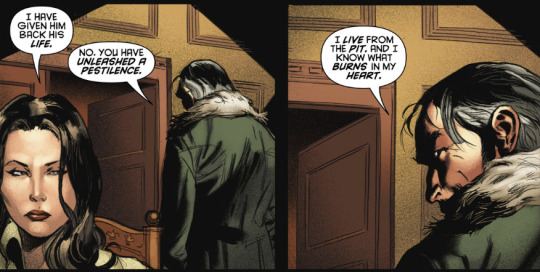














Quotes from A Critical History of English Literature by David Daiches. Panels from Death in the Family, Under the Red Hood, Lost Days, and Batman and Robin.
#OKAY SO i have been thinking about the hamlet post since i reblogged it the other day so i had to find panels to fit it#anyway i don't post about him much BUT#i do find jason fascinating both in terms of the Nonstop Emotional Intensity but also because on a narrative level#this is hard to articulate and possibly you need access to my dartboard of string in order to understand but#at some moments it's almost structurally as if you took the hero of a classic tragedy#and you put him in a story where he's the villain#it's like. what if hamlet but the story was told from the point of view of laertes#what if antigone but our pov character was ismene#you take the epic greek tragedy-esque stage and the tragic dramatic hero outraged at a terrible crime and the pile of bodies#and like. all of that is still true!! he really did get murdered!! it was really bad!! it's legit that he is mad about it!!#but then you frame it all from the perspective of the people going#'you just killed my dad and drove my sister to suicide you jackass'#and!!! they're not wrong either!!#and just ahhhh the way you can do that perspective-flip is just endlessly fascinating to me#web weaving#my comic art but we are using the term ''art'' loosely
130 notes
·
View notes
Text

The lament for Eteocles and Polynices illustrated by John Flaxman. From The Seven Chiefs Against Thebes.
With what a ruthless and destructive rage The Furies hurl their vengeful shafts around And desolate the house of Oedipus!
#ismene#antigone#polynices#eteocles#(furtest right and furthest left characters are named as chorus and herald respectively)#aeschylus#the thebaid#seven against thebes#greek mythology#john flaxman
41 notes
·
View notes
Note
Another tragic woman that im pretty sure Noone ever talks about is Ismene, daughter of Oedipus. Like, Girl lost everyone, both her brothers, her mother, her father, and how much she tried not to lose Antigone as well, but lost.
Yeah… I think she lost her lover too, girl can’t catch a break.
20 notes
·
View notes
Text
obsessively thinking about antigone tonight. queer antigone / antigone as a product of incest displaying incestuous undertones&themes herself / married through death antigone (anouilh’s antigone, who wanted to have her first time with hemon the evening before she goes to bury her brother, who wanted to die not-a-virgin and yet not-a-wife but who didn’t, because they fought instead) / antigone who only knows how to live for oedipus / antigone who only knows how to die for her brothers / antigone who is nothing but her love for her family / antigone who leaves ismene behind / antigone who knows her brothers have been cursed by her father but still goes back to thebes, because she has to / antigone who knows creon will remove the dirt she puts on polyneikes’ body, but still puts it there, because she has to / antigone ready to die, born to die / antigone already dead from the beginning, her fate sealed long ago / antigone leaving thebes as a child knowing she will only come back to die.
#antigone#it’s probably my favorite tragedy#which says a lot because i love many ancient tragedies#but antigone ?#i love her so much#i have so many versions of her story now#plays : sophocles (3 translations including one by anne carson) / anouilh / cocteau#novels : henry bauchau’s oedipus on the road + antigone#and it breaks me every single time#classics#oedipus#jocasta#ismene#eteokles#polyneikes#polynices
108 notes
·
View notes
Text
#poll#speaking of polls. i am curious to see what opinions this might turn up#oedipous#antigone#ismene#creon and jocasta should probably be options but i'm asking this for my own benefit rather than actually grouping together protagonists
66 notes
·
View notes
Text
Contrasting the Theban cycle and the Oresteia and. Clawing at the walls. Oh, they’re so opposite but so similar.
The House of Atreus is driven by hate. Clytemnestra hated Agamemnon. Orestes hated Clytemnestra. The Furies hated Orestes. It was all about revenge and hatred.
The House of Laius l, however, is all about love. Antigone died for her love of Polynices. Haemon died for his love of Antigone. Eurydice died because of her love of Haemon. There was revenge in the form of love.
And it’s all about siblings. Clytemnestra and Helen. Agamemnon and Menelaus. Orestes and Electra and Iphigenia. Antigone and Polynices. Antigone and Ismene. One of them is already dead, there’s no way to get them back. But they can still be loved. Their love can speak for one last time.
It could only be for their siblings. Not for spouses. Not for children. Only for siblings would they revenge their brothers and sisters.
#greek mythology#greek tragedy#classics#greek literature#tagamemnon#orestes#electra#antigone#ismene#the oresteia#the theban plays#Antigone by Sophocles
58 notes
·
View notes
Text





From a web weave in June.
21 notes
·
View notes
Text
wait now that i think about it... antigone really does look like the product of the transition from two-actor to three-actor plays. it's so very agonistic with all those scenes pairing two characters arguing or otherwise at odds with each other (antigone and ismene, creon and the sentry, creon and antigone, creon and haemon, creon and tiresias). there's rarely a third person present for these arguments, and in the two places where there is it's. weird. like the scene where the sentry brings antigone in and then he and creon proceed to talk to each other while antigone remains silent, as if she isn't even there or actually cannot speak. and then the moment it looks like antigone's going to speak and it's going to become a conversation between her and creon, the unnecessary third party is dismissed from the stage, so the whole scene is two dialogues back to back instead of one trialogue. and the scene with creon, antigone, and ismene where the whole point is that ismene's NOT part of this and that the play is a two-party affair from which she is ultimately excluded. and the debate over whether the protagonist would have played the role of creon or antigone-- it makes sense if you're thinking of a historical moment where there are two primary actors of pretty much equal standing, plus another recently-added actor, perhaps of lesser status. the two main actors get their equally prominent roles, and the minor third actor shows up here and there as ismene and the sentry and maybe eurydice.
#really liking the implications of antigone coming back as haemon and tiresias too!!!#antigone who would not speak in her own defense becomes others who will#you can do whatever with the eurydice scene but probably eurydice is ismene and antigone is the messenger of her own death#bc creon enters pretty quickly afterward#ajax is also pretty awkward when it comes to scenes with all three actors but it makes more sense structurally/plotwise there#and honestly most plays are awkward when all three actors are on stage and just switch which two are talking back and forth#mine#antigoneblogging
53 notes
·
View notes
Text
Happy Nameday to Athena, Aphrodite, Dione, Sappho, Penelope, Pandora, Antigone, Ismene, Kleopatra, Polymnia, Thalia, Efterpi, Ourania, Kalliroe, Kallisti, Kleio, and all the Greek women with many more such beautiful names! Να σας χαιρόμαστε! 💙💙💙
#I don't usually do Namedays because every single day is a nameday in Greece but this day holds many of my favourite Greek names#Also happy name day if your name is Iisous xD Because Greeks do be like that!#greek names#athena#aphrodite#dione#sappho#penelope#pandora#antigone#ismene
20 notes
·
View notes
Text
walking in circles in my room with my head bowed muttering ‘how will i live without her’ over and over again to myself like a woman on the edge of a breakdown. how will i live without her. how will i live without her. sometimes the worse fate is to be the one left alive
#FUCKK OFFFFFF I CANT DO THIS.#DOES ANYONE CARE ABOUT ISMENE. DOES ANYONE THINK ABOUT HER. DOES ANYONE NOTICE#have you won because you survived but you would have rather died for love than remain alive without it. you’re alone ismene you’re alone.#WAKE. UP.#antigone#mossy posts#ismene#🏺
14 notes
·
View notes